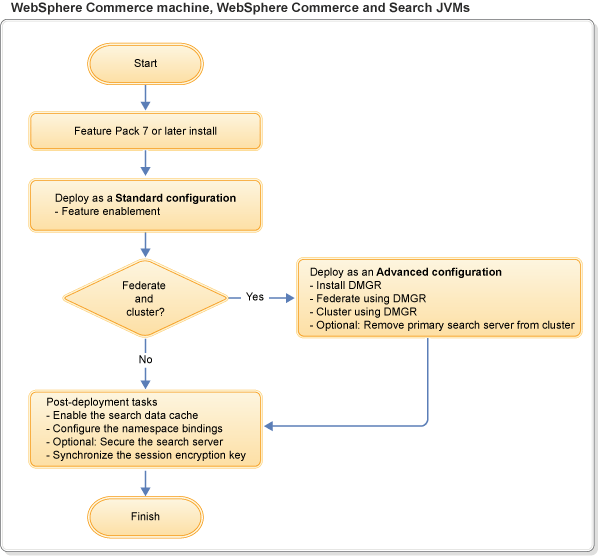 Deploying the WebSphere Commerce search server locally in the standard configuration
Deploying the WebSphere Commerce search server locally in the standard configurationYou can deploy the search server on your WebSphere Commerce server by running the feature enablement scripts. This script creates and deploys a separate search profile and web module on the same machine as the WebSphere Commerce profile.
 Federating and clustering the WebSphere Commerce search server in the advanced configuration
Federating and clustering the WebSphere Commerce search server in the advanced configurationOnce you deploy the WebSphere Commerce search server in the standard configuration, you can federate the node to the deployment manager (DMGR) and create a cluster that contains the WebSphere Commerce and WebSphere Commerce search servers.
 Configuring the WebSphere Commerce and WebSphere Commerce search server namespace bindings
Configuring the WebSphere Commerce and WebSphere Commerce search server namespace bindingsAfter deploying WebSphere Commerce search, you must configure the namespace bindings to ensure that search requests are handled correctly. The WebSphere Commerce and WebSphere Commerce search servers use namespace bindings defined in the WebSphere Application Server Administrative Console. Instead of defining the server URL in the wc-search.xml file, you can specify a reference to the search URL name binding.
 Removing the primary WebSphere Commerce search server from the cluster
Removing the primary WebSphere Commerce search server from the clusterAfter you federate and cluster the WebSphere Commerce search server in the advanced configuration, you can optionally remove the primary search server from the cluster.
 Enabling the WebSphere Commerce search data cache
Enabling the WebSphere Commerce search data cacheThe search server data cache uses DistributedMap object caches, which are defined automatically during feature pack installation.
 Securing the WebSphere Commerce search server
Securing the WebSphere Commerce search serverIt is recommended that you secure WebSphere Commerce search by enabling WebSphere Application Server Administrative Security. You can further secure your search server by optionally enabling WebSphere Application Server Application Security. Enabling Application Security results in securing Solr Administrative services so that only authenticated users can run these services. For example, updating, deleting, and building a search index. However, performance degradation might be associated with enabling Application Security.
 Synchronizing the session encryption key with WebSphere Commerce search
Synchronizing the session encryption key with WebSphere Commerce searchIf you are using local authentication on the WebSphere Commerce search server, ensure that the session key is synchronized between WebSphere Commerce and WebSphere Commerce search. Complete this task every time you change the encryption key on the WebSphere Commerce server.

 Deploying and working with the WebSphere Commerce search server in the managed configuration
Deploying and working with the WebSphere Commerce search server in the managed configurationYou can deploy and work with the WebSphere Commerce search server in the managed configuration. The managed configuration is a variation of the advanced configuration, but contains streamlined configuration tasks, where all managed production Solr cluster members are federated and managed by a deployment manager.


